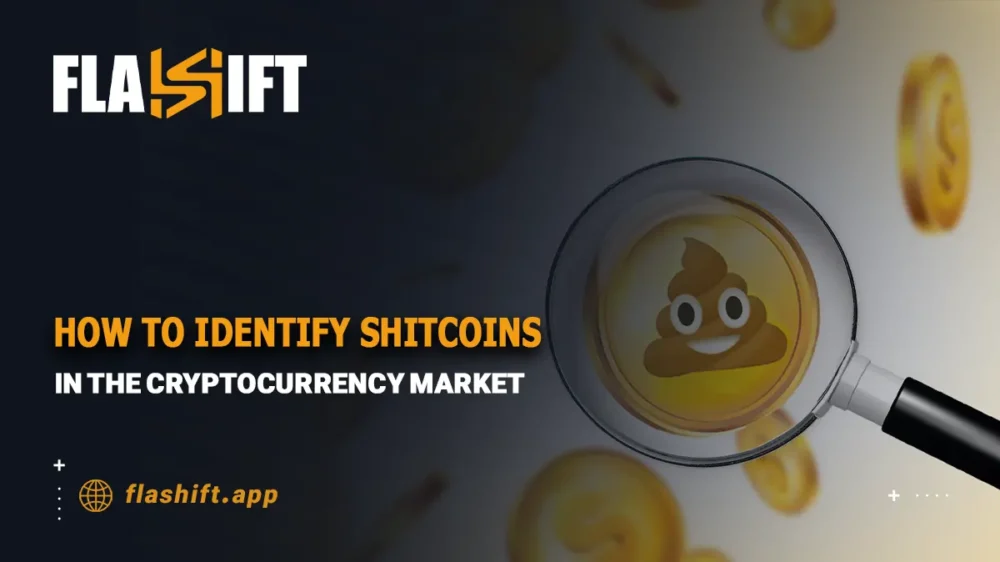Identify Shitcoins | The cryptocurrency market has gained exponential growth, promising excellent investment opportunities and carrying a large amount of risks. These risks include “shitcoins,” which refer to low-value or poorly conceived cryptocurrencies that offer little utility, have no development to back them, and consequently have no long-term promise. Such projects often show up during the market hype, luring uninformed investors by promising them unrealistic returns while leaving them to face remarkable losses.
You should know what is shitcoin? Being able to identify and avoid shitcoins is a critical component of anyone’s crypto journey, be it a seasoned investor or an amateur enthusiast. This paper shall outline the features of shitcoins, why they have thrived in the cryptocurrency ecosystem, and how investors can safeguard themselves against falling prey to such a venture. Equipped with the proper knowledge, you can protect your investments and zero in on more genuine opportunities in this vibrant market.
Common Characteristics of Shitcoins
Shitcoins are rampant in the cryptocurrency market, often disguised as promising investments but lacking the fundamentals needed for long-term success. Understanding their common traits is essential to identifying and avoiding these risky assets.
1. Lack of Clear Use Cases or Utility
A genuine cryptocurrency project solves real-world problems or enhances blockchain technology. Shitcoins, however, often lack any meaningful utility or purpose. They exist solely to capitalize on hype, offering little beyond vague promises and buzzwords. If a project cannot clearly articulate its value proposition, it’s a red flag for investors.
2. Poorly Defined or Absent Development Teams
Reputable projects are typically backed by experienced, transparent teams with verifiable track records in blockchain, technology, or finance. Shitcoins, by contrast, frequently have anonymous developers or teams with questionable credentials. The project will likely fail without a credible team to ensure ongoing development and innovation.
3. Overhyped Marketing Without Substance
Shitcoins depend a lot on flashy marketing campaigns to create a feeling of urgency or exclusivity. Most use aggressive tactics: social media influencers, exaggerated claims, and “fear of missing out” to lure investors. A robust product or sustainable business model rarely supports their marketing.
By recognizing these characteristics, investors can protect themselves from cryptocurrency scams and focus on projects with genuine potential. Please remember that diligence is the key to navigating the crypto landscape safely.
Red Flags to Watch For
Navigating the cryptocurrency market can be challenging, especially with many projects promising massive gains. To avoid falling victim to shitcoins, it’s vital to recognize key red flags that signal a risky or fraudulent investment.
1. Unrealistic Promises of High Returns
One of the most glaring shitcoin red flags is the promise of guaranteed or extraordinarily high returns in a short period. Legitimate investments carry risks, and no credible project can guarantee profits. Such claims are often a hallmark of pump-and-dump schemes that lure unsuspecting investors.
2. Anonymous or Unverified Team Members
Transparency is a cornerstone of trustworthy cryptocurrency projects. Shitcoins often feature anonymous creators or team members with unverifiable credentials. Without clear accountability or proven expertise driving the project, there’s little assurance of its legitimacy or long-term viability.
3. Absence of a Detailed Whitepaper or Roadmap
A well-documented whitepaper and a clear roadmap are essential for understanding a project’s purpose, technology, and development goals. Shitcoins typically lack these foundational elements or offer vague, poorly written documents filled with buzzwords. This absence significantly indicates a project’s lack of direction and seriousness.
By staying vigilant and recognizing these red flags, you can significantly reduce crypto investment risks and steer clear of scams. Avoiding cryptocurrency scams requires critical thinking, thorough research, and a cautious approach to new projects. Remember: if something sounds too good to be true, it probably is.
Case Studies: Notable Shitcoin Scams
The cryptocurrency market’s decentralized nature has made it a breeding ground for scams, with countless investors falling victim to fraudulent projects. Studying notable cases like the Squid Game cryptocurrency scam can provide valuable insights into how to identify shitcoins and avoid falling prey to similar traps.
Inspired by the Netflix sensation Squid Game, which has gained immense popularity worldwide, the SQUID token was launched in October 2021. Positioning itself as a “play-to-earn” cryptocurrency, the project offered its participants a game in which they would be rewarded. The hype from the popular show helped the token gather pace quickly, thus reflecting a meteoric rise in value.
What Happened
The token’s price surged from $0.01 to over $2,800 in days, driven by speculative buying and aggressive marketing. However, it soon became apparent that investors could not sell their tokens due to restrictions coded into the smart contract—a deliberate design choice by the scammers.
In a classic rug pull, the anonymous developers abruptly disappeared, taking an estimated $3.38 million in investor funds and leaving the token worthless.
Red Flags and Takeaways
- No Official Affiliation: Despite its name, the project had no connection to Netflix or the Squid Game creators.
- Excessive Hype and Unrealistic Gains: The token’s rapid price increase was based solely on speculation, with no underlying utility or value.
- Opaque Team: The developers remained anonymous, providing no verifiable credentials or accountability.
- Flawed Tokenomics: The inability to sell tokens was an intentional mechanism to trap investors and artificially inflate prices.
Lessons Learned
- Always verify the legitimacy of a project’s affiliations and team members.
- Be wary of investments that promise extraordinary returns in a short time.
- Carefully analyze a token’s mechanics, whitepaper, and overall feasibility before investing.
By understanding cases like the Squid Game scam, investors can better navigate the risks of cryptocurrency scams and avoid being lured into similar fraudulent projects. Identifying shitcoins requires skepticism, research, and a focus on genuine value over hype.
Best Practices for Avoiding Shitcoins
Investing in cryptocurrencies can be lucrative, but the prevalence of shitcoins and scams necessitates a cautious approach. Implementing these best practices can help you identify shitcoins and minimize crypto investment risks, ensuring safer and more informed decisions.
1. Conduct Thorough Research (DYOR)
The cornerstone of safe crypto investing is diligent research. Before investing, evaluate a project’s:
- Whitepaper: Do you know if it clearly outlines the project’s purpose, technology, and goals?
- Roadmap: Are the milestones realistic and achievable?
- Tokenomics: Understand the token’s supply, distribution, and use cases.
By diving deep into a project’s details, you can discern whether it has genuine potential or is just another hype-driven venture.
2. Verify the Credibility of the Development Team
A transparent team often leads a trustworthy project with verifiable credentials. To ensure credibility:
- Check the team’s background on LinkedIn or other professional platforms.
- Please look for prior experience in blockchain, technology, or finance.
- Avoid projects with anonymous developers unless they have a strong, verifiable track record (e.g., Bitcoin’s pseudonymous creator, Satoshi Nakamoto, is a rare exception).
3. Assess Community Engagement and Activity
A strong, active community is often a positive sign of a legitimate project. Look for:
- Engagement: Are there genuine discussions and support from the community?
- Transparency: Is the team regularly updating the community about progress?
- Reputable Forums: Check platforms like GitHub for development activity and Reddit or Twitter for user feedback.
4. Do Your Research
You know the drill – do your research! But what kind of research? Don’t just skim the surface. Dig deep! Start by demanding to see the project’s whitepaper. Seriously, find it and read it. Is it easy to understand? Does it clearly lay out the project’s goals and how they plan to achieve them? If it’s full of jargon or doesn’t really explain anything, that’s a major red flag . Next up: the team. Who are these people? Are they hiding behind pseudonyms, or are they upfront about their experience? A solid, transparent team is a must.
Additional Tips for Safe Crypto Investments
- Avoid projects that focus solely on marketing buzzwords or unrealistic promises.
- Please be careful about the tokens promoted by influencers without showing value.
- Diversify your portfolio to mitigate risks from any single investment.
By adhering to these best practices, you can better navigate the cryptocurrency market, identify shitcoins, and make informed, safer investment decisions. Remember that patience and critical thinking are your best tools for avoiding scams and maximizing returns.
Tools and Resources for Evaluating Cryptocurrencies
Evaluating cryptocurrency projects for investment requires the right tools and access to reliable information. Leveraging trusted platforms and community insights can help you make informed decisions, avoid scams, and identify legitimate opportunities. Here are some essential tools and resources for cryptocurrency evaluation.

1. Data Analysis Platforms
CoinGecko
CoinGecko is a comprehensive cryptocurrency data aggregator that provides insights into:
- Market capitalization, trading volume, and price trends.
- Fundamental metrics like circulating supply and tokenomics.
- Community statistics, including social media activity and developer engagement.
Its intuitive interface makes it an excellent starting point for evaluating cryptocurrencies.
CoinMarketCap
Another leading platform, CoinMarketCap, offers similar features, including:
- Detailed price charts and historical performance.
- Rankings of cryptocurrencies by market cap and trading volume.
- Additional resources like educational materials and news updates.
Both platforms are invaluable for identifying emerging projects and spotting anomalies in existing ones.
2. Cryptocurrency Forums and Communities
Reddit and Telegram
These platforms are popular hubs for cryptocurrency discussions:
- Reddit: Subreddits like r/cryptocurrency or r/cryptomarkets provide analysis, opinions, and warnings about scams.
- Telegram: Many projects maintain official Telegram groups for real-time updates and direct interaction with the development team.
3. Open-Source Repositories
GitHub
Reviewing a project’s GitHub repository can provide insights into:
- Development activity and code quality.
- Whether the project is actively maintained or stagnant.
- Transparency in development practices.
4. Educational and News Platforms
- CryptoSlate and Decrypt: Offer detailed news coverage and project analysis.
- Messari: Provides in-depth research reports for professional-level insights.
Best Practices
When using cryptocurrency evaluation tools:
- Cross-reference information from multiple platforms.
- Focus on data consistency and avoid relying solely on hype.
- Participate actively in forums to benefit from crowd-sourced knowledge and cautionary advice.
With these tools and resources, you can confidently evaluate cryptocurrency projects for investment, identify genuine opportunities, and steer clear of scams.
Conclusion: Making Informed Investment Decisions
In the crypto ocean, volatility calls for care and due diligence so your investments do not go down the drain. Help yourself to identify shitcoins, always be at war with any cryptocurrency scams, make intelligent and informed decisions, build interest in valid projects only for valuable reasons, and take care of your investments in this jungle with patience and extensive research.
FAQ
- How can I differentiate a shitcoin from a legitimate cryptocurrency?
To differentiate, look for a project with a solid whitepaper, a transparent and experienced development team, and straightforward use cases. Shitcoins often lack these elements and instead rely on speculative hype or vague promises.
- How do I recognize if a cryptocurrency project is a scam?
A project may be a scam if it lacks a verifiable team, makes exaggerated claims of quick profits, or lacks transparency in its development and goals. Always research thoroughly before investing.
- What’s the best way to avoid investing in shitcoins?
Conduct thorough research, verify the credibility of the development team, and assess the project’s community engagement. These practices help ensure the investment is legitimate and backed by a strong team and meaningful project.
- What platforms can help me evaluate a cryptocurrency project?
CoinGecko and CoinMarketCap are excellent tools for tracking market data, tokenomics, and project metrics. These platforms provide detailed insights to help you make informed investment decisions.
- How can cryptocurrency forums and communities assist in evaluating projects?
Communities on platforms like Reddit, Telegram, and Discord offer firsthand feedback and real-time discussions. Engaging in these forums helps you gauge sentiment, learn about new projects, and spot potential scams.







